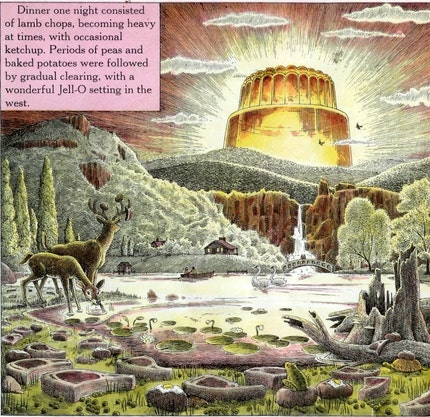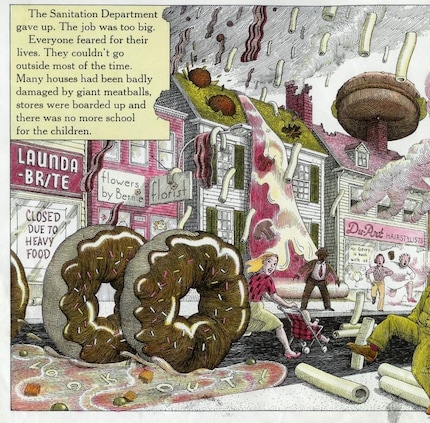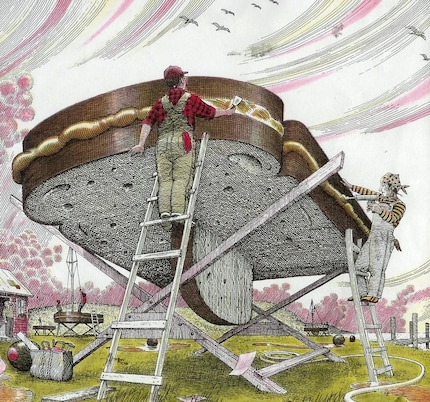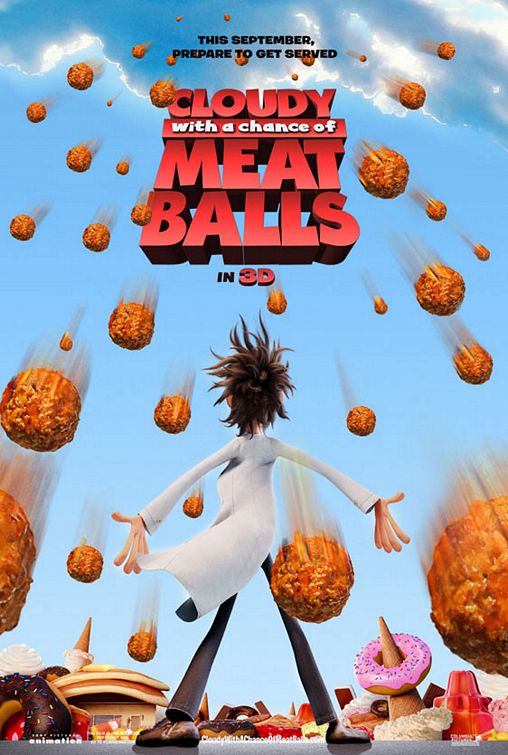 One of my favorite books growing up was Cloudy with a Chance of Meatballs, a children's story about a town, Chewandswallow, where the precipitation comes in the form of food, so no one has to buy or cook any meals. Perhaps it was my ravenous appetite or my roly-poly physique, but something about the story captured my imagination. Of course, the detailed, whimsical illustrations and the fable-esque, Grandpa-telling-tales bookend structure probably had something to do with it as well.
One of my favorite books growing up was Cloudy with a Chance of Meatballs, a children's story about a town, Chewandswallow, where the precipitation comes in the form of food, so no one has to buy or cook any meals. Perhaps it was my ravenous appetite or my roly-poly physique, but something about the story captured my imagination. Of course, the detailed, whimsical illustrations and the fable-esque, Grandpa-telling-tales bookend structure probably had something to do with it as well. Part of me wondered about the questions left unaddressed in the book: Doesn't the food get dirty when it falls? How do they wash it off? Don't they worry about bacteria? Does it spoil at all? Does it contain preservatives? Are there cloud butchers and chefs chopping up the animals and showering their carcasses onto the earth? Where did the sky animals come from? What do the vegetarians do? And just where is Chewandswallow? Is it in God's America, or some heathen country? Not having the answers to these questions only deepened the fable aspects of the story, making me love it all the more.
Part of me wondered about the questions left unaddressed in the book: Doesn't the food get dirty when it falls? How do they wash it off? Don't they worry about bacteria? Does it spoil at all? Does it contain preservatives? Are there cloud butchers and chefs chopping up the animals and showering their carcasses onto the earth? Where did the sky animals come from? What do the vegetarians do? And just where is Chewandswallow? Is it in God's America, or some heathen country? Not having the answers to these questions only deepened the fable aspects of the story, making me love it all the more. Like any good fable, the good times don't last for the town of Chewandswallow. The sky chefs and butchers, or whoever, turn against them, and the food downpours become food natural disasters. It starts off bad and slowly builds. I particularly recall the blizzard of awful sandwiches (jelly and mayonnaise?) that makes everyone sick to their stomachs. The childrens' white, ashen faces made them look like they were about to die of scurvy.
Like any good fable, the good times don't last for the town of Chewandswallow. The sky chefs and butchers, or whoever, turn against them, and the food downpours become food natural disasters. It starts off bad and slowly builds. I particularly recall the blizzard of awful sandwiches (jelly and mayonnaise?) that makes everyone sick to their stomachs. The childrens' white, ashen faces made them look like they were about to die of scurvy. No reason is ever given for the turn in luck--it's just the way things are, a natural disaster of epic proportions. Homes are destroyed, schools close, government shuts down, and people can literally take a flying fuck at a rolling doughnut.
No reason is ever given for the turn in luck--it's just the way things are, a natural disaster of epic proportions. Homes are destroyed, schools close, government shuts down, and people can literally take a flying fuck at a rolling doughnut. Eventually, the people of Chewandswallow must abandon their town by building sailboats out of food and venturing to a new land, where it rains and snows like normal and they have to learn to go to grocery stores and make regular pancakes and learn to come to terms with being abandoned by their food overlords.
Eventually, the people of Chewandswallow must abandon their town by building sailboats out of food and venturing to a new land, where it rains and snows like normal and they have to learn to go to grocery stores and make regular pancakes and learn to come to terms with being abandoned by their food overlords.
Earlier this month, a coworker mentioned that a movie based on the book would soon be coming out. I was very excited to hear this, and quickly sought out the movie's website. The images that greeted me were not encouraging.

Mother...fucker....

Who the fuck are these people? Why are they in a movie based on my beloved children's book? Why did the studio completely neglect the beauty of the book and instead choose to go with the ugliest, most godawful CGI animation possible? Why do they want to make my eyes bleed? Once again, Cloudy with a Chance of Meatballs fills me with questions. This time, however, these questions did not deepen anything, except for my anger.
When I went to see Up, I finally bore witness to the trailer for this abomination. At first, I had no idea it was even for Cloudy with a Chance of Meatballs, because the trailer begins not with a town, and not with a naturally occurring situation, but with a character shoehorned in where he does not belong, scrambling to provide mouth breathing studio executives with a safe, cliche arc that will take the story through the exact same paces everyone has seen approximately 50,000 times.
You know what this is? This is that parody on a sketch comedy show, where they do the bit about Hollywood infantilizing and dumbing down great literature to make it palatable for the unwashed masses. Except it's for real. And as much I should be inured to this kind of thing, it still breaks my heart.
Please, Hollywood. You can have your Scooby-Doo and do what you like to him. Go ahead and let Michael Bay continue to make incoherence out of the Transformers. Put G.I. Joe into accelerator suits and shoot missiles up his ass, and let Ridley Scott turn Rich Uncle Pennybags into an action hero by filming him with a dozen different frame rates. I don't care about those things, because they were all about selling bullshit to children in the first place, and not very good to begin with.
But this is different. This is Cloudy with a Chance of Goddamn Meatballs.
They came first for The Cat in the Hat, and I didn't speak up because I didn't read Seuss. Then they came for The Polar Express, and I didn't speak up because I didn't read Van Allsburg. Then they came for Cloudy with a Chance of Meatballs, and by that time no one was left to speak up...
Right after that trailer, I had to sit through the one for G-Force. It made me feel even worse, despite the presence of Zach Galifianakis and Will Arnett.
This felt like another parody, only this time it's one of those fake movies you see in the background of a Hollywood satire. The contempt for the audience is palpable in this trailer; I'm somewhat surprised they didn't openly title it Piece of Shit: The Movie (the sequel could be called Piece of Shit: Second Flush). I think what puts me off is that the trailer takes itself (almost) completely seriously in the opening portion. You'd think they'd start off a trailer about guinea pig spies with broader comedy to say "See? We know it's fucking stupid! But it's going to be fun anyway!" But they don't seem concerned about easing audiences into a patently ludicrous concept. And why should they? We made Wild Hogs gross more than $100 million.
Hmm...perhaps I should embrace G-Force as an utterly cynical ploy to exploit people's indifference to their cultural consumption. Perhaps it's really a bitter, devastating satire. Let us hope...for that is all we have...
When I went to see Up, I finally bore witness to the trailer for this abomination. At first, I had no idea it was even for Cloudy with a Chance of Meatballs, because the trailer begins not with a town, and not with a naturally occurring situation, but with a character shoehorned in where he does not belong, scrambling to provide mouth breathing studio executives with a safe, cliche arc that will take the story through the exact same paces everyone has seen approximately 50,000 times.
You know what this is? This is that parody on a sketch comedy show, where they do the bit about Hollywood infantilizing and dumbing down great literature to make it palatable for the unwashed masses. Except it's for real. And as much I should be inured to this kind of thing, it still breaks my heart.
Please, Hollywood. You can have your Scooby-Doo and do what you like to him. Go ahead and let Michael Bay continue to make incoherence out of the Transformers. Put G.I. Joe into accelerator suits and shoot missiles up his ass, and let Ridley Scott turn Rich Uncle Pennybags into an action hero by filming him with a dozen different frame rates. I don't care about those things, because they were all about selling bullshit to children in the first place, and not very good to begin with.
But this is different. This is Cloudy with a Chance of Goddamn Meatballs.
They came first for The Cat in the Hat, and I didn't speak up because I didn't read Seuss. Then they came for The Polar Express, and I didn't speak up because I didn't read Van Allsburg. Then they came for Cloudy with a Chance of Meatballs, and by that time no one was left to speak up...
Right after that trailer, I had to sit through the one for G-Force. It made me feel even worse, despite the presence of Zach Galifianakis and Will Arnett.
This felt like another parody, only this time it's one of those fake movies you see in the background of a Hollywood satire. The contempt for the audience is palpable in this trailer; I'm somewhat surprised they didn't openly title it Piece of Shit: The Movie (the sequel could be called Piece of Shit: Second Flush). I think what puts me off is that the trailer takes itself (almost) completely seriously in the opening portion. You'd think they'd start off a trailer about guinea pig spies with broader comedy to say "See? We know it's fucking stupid! But it's going to be fun anyway!" But they don't seem concerned about easing audiences into a patently ludicrous concept. And why should they? We made Wild Hogs gross more than $100 million.
Hmm...perhaps I should embrace G-Force as an utterly cynical ploy to exploit people's indifference to their cultural consumption. Perhaps it's really a bitter, devastating satire. Let us hope...for that is all we have...



